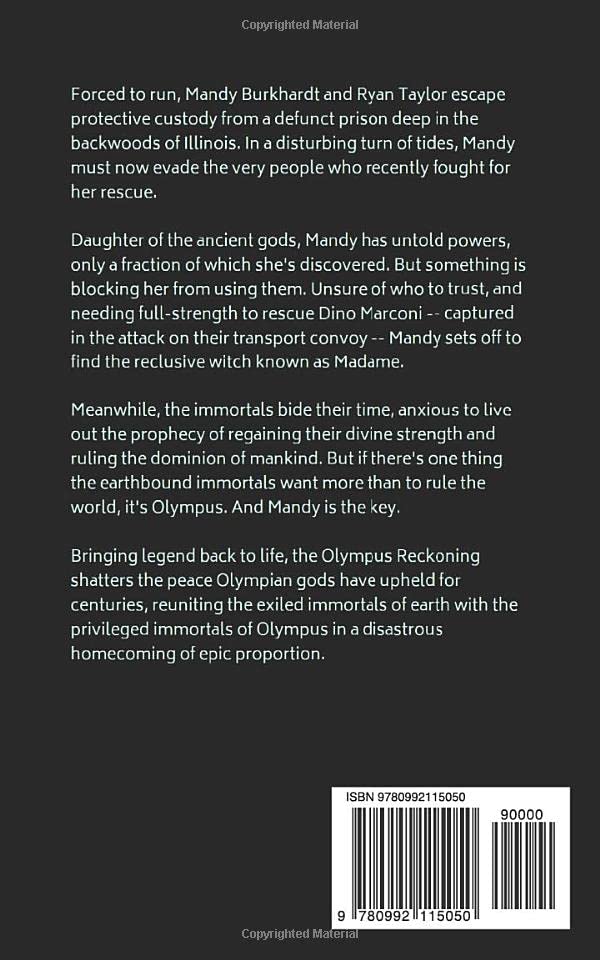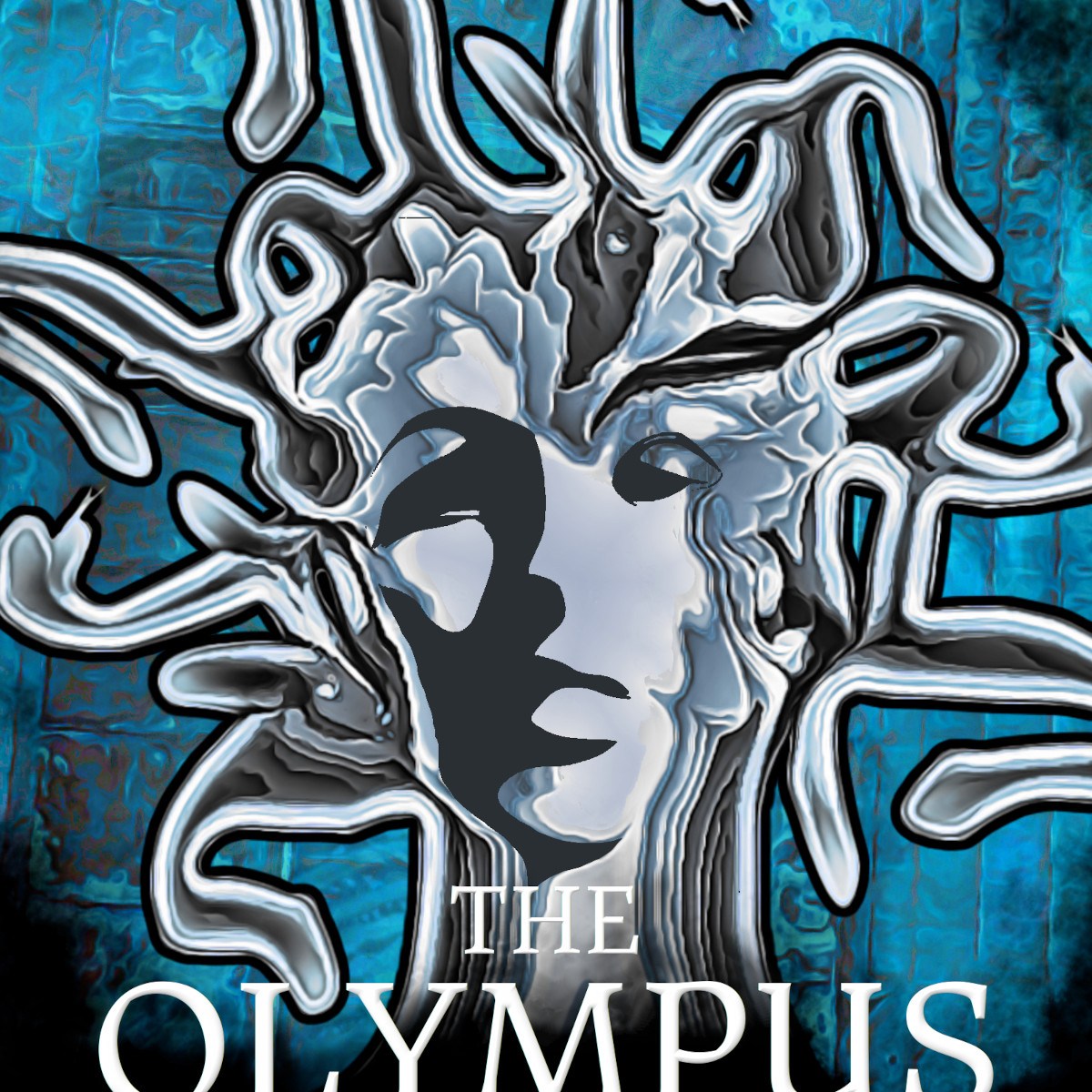

Written by Linda Temple
It’s somewhat ironic that as I read The Olympus Reckoning, the last book in The Medusa Legacy Trilogy, I’m struck by what great openings Linda Temple writes for her books. It’s true of both the previous books in the trilogy (you can read my review of The Medusa Deception here and my review of The Dodona Prophecy here), and it’s true of SIMBiotic (you can read that review here). Perhaps it’s because it’s the closing book in the trilogy, with all the heightened stakes a finale brings, but The Olympus Reckoning provides the best opening chapter of her bibliography. A novel’s opening chapter should set the scene while whetting the reader’s appetite, but The Olympus Reckoning grabs the reader’s attention and forces them to pay attention.
While stories often have shock endings, shock openings are less common. The Dodona Prophecy‘s ending set the scene for the finale, hinting at the threat that’s due to come to pass in the finale. The Olympus Reckoning opens some time after the second book, where that threat has already come to pass. Protagonist Mandy and her friend, Ryan, are imprisoned as the world deals with the threat of immortals determined to gain the power they believe is owed to them. It’s a pulse-pounding opening that quickly and firmly establishes the stakes involved.
At 333 pages in paperback (or an estimated 335 pages on your eReader), The Olympus Reckoning’s length sits snugly between the first two books. The story’s canvas is grander than those other books, and its scope wider. After a tense opening, the book slows down, letting the reader catch their breath, while reverting to the storytelling style that has worked as the trilogy’s hallmark. Throughout the book, Temple has paced it wonderfully, building momentum while avoiding any of the book feeling rushed. Once the book reaches its third act, it moves at a breakneck pace; a fitting crescendo, not just to this entry, but the entire Medusa Legacy Trilogy, packed full of action. This is unlike anything the series has offered before, yet it fits within the world’s rules and atmosphere perfectly.
I’ll avoid discussing The Olympus Reckoning’s plot in any further detail, because doing so would risk your enjoyment of not just this book, but the two that preceded it. The book is more densely plotted than the first two, but not to the point where it feels overdone. It’s exactly where it should be, feeling appropriately epic, while closing out the tale. There are a number of callbacks to the previous books, rewarding readers’ investment in the series. Largely, it is gripping, though the first act doesn’t move as quickly as the rest of the book, focusing primarily on the characters. Elements of the plot don’t ring entirely true, particularly towards the end as various threads are resolved, feeling a little too convenient. These elements are charming and pay off the trilogy appropriately, but I would have liked to see more shades of grey. The book features a number of twists and turns leading to this ending, and as enjoyable as they are, none of them are a big surprise. The story largely moves in the direction I expected it to.
While I haven’t discussed it in my reviews of The Medusa Deception and The Dodona Prophecy, the trilogy has revolved around family. Whether it’s Mandy’s family and their history, Ryan and his mother, Dio’s family of police officers, or the Greek pantheon and their interesting familial dynamics, family has always been the centre of the story. Not only does The Olympus Reckoning continue to explore these themes, it plays to them. It plays to all the characterisation that came from it in those first two books, and in many ways brings closure to them. This closure works wonderfully, and will satisfy readers who have followed the characters through the three books.
That the familial themes resonate as much as they do is a testament to the trilogy’s characters. Mandy is the star of the show, and as the protagonist, continues to anchor the story and provide much of its resonance. She is a thoroughly entertaining character and is a joy to follow. Dio works as the book’s secondary lead, with him having some great moments to shine. The third character in the trio is Ryan, and he plays a smaller part in this outing. While given some entertaining moments, he doesn’t shine as much as the other characters. If you recall my previous reviews, I wasn’t a fan of him in the first book, and he grew on me in the second. Here, I would have liked to have seen more of him. The side characters—including the villains—are all thoroughly entertaining. Perhaps none of these are more entertaining than the Greek gods themselves. Temple has crafted these characters to capture the aloofness from the myths, while also imbuing them with entertaining personalities that feel natural in the trilogy’s heightened reality.
Once again, the use of Greek mythology is expertly handled, providing a great view of it that feels both reverent of these stories, while feeling modern. Greek mythology fans will love how it’s used, and readers not across it won’t feel lost, thanks to the book putting everything into perspective. It invites the reader to enjoy the story, something that the book does throughout, with an engaging—and oftentimes amusing—style of writing.
As you would expect from the final book in a trilogy, The Olympus Reckoning does not stand alone. If, for some reason, however, you decide to read it in isolation, it does feel like a complete book. It takes the time to refresh readers on what came before, while also being friendly to anybody new.
While I have some issues with The Olympus Reckoning’s plot, the book is a fitting—and epic—finale to the trilogy. While this trilogy has come to a close, there are areas Temple could explore, should she wish to, in a future series. And should she do that, I’ll be waiting.
Favourite Passage
If there was one thing carnivorous species had going for them, it was the meat. The meat was fantastic, plentiful and cooked to perfection. Zeus had eaten more than his share. Sure, there were unproud moments in the cats’ early history when they’d eaten it raw, but they were no longer heathens. They were civilised now, more or less — other than the communal grooming that was taking place following the feast.
The Olympus Reckoning: Book Three of the Medusa Legacy Trilogy, Chapter 13
The Olympus Reckoning: Book Three of the Medusa Legacy Trilogy was provided by the author for the purpose of an honest review.
The Olympus Reckoning is available in both paperback, exclusive to Amazon, and eBook from retailers, including—but not limited to—Amazon.
Note: I do not post scores for reviews on this website, but do post them on my Amazon and Goodreads reviews:
- Amazon
- Goodreads
You can follow Linda Temple online, via:

Interested in purchasing The Olympus Reckoning?
Please find a link below; please note I do not collect any proceeds from the sale.
The Olympus Reckoning (The Medusa Legacy Book 3)

